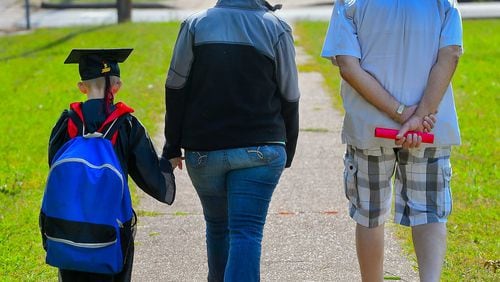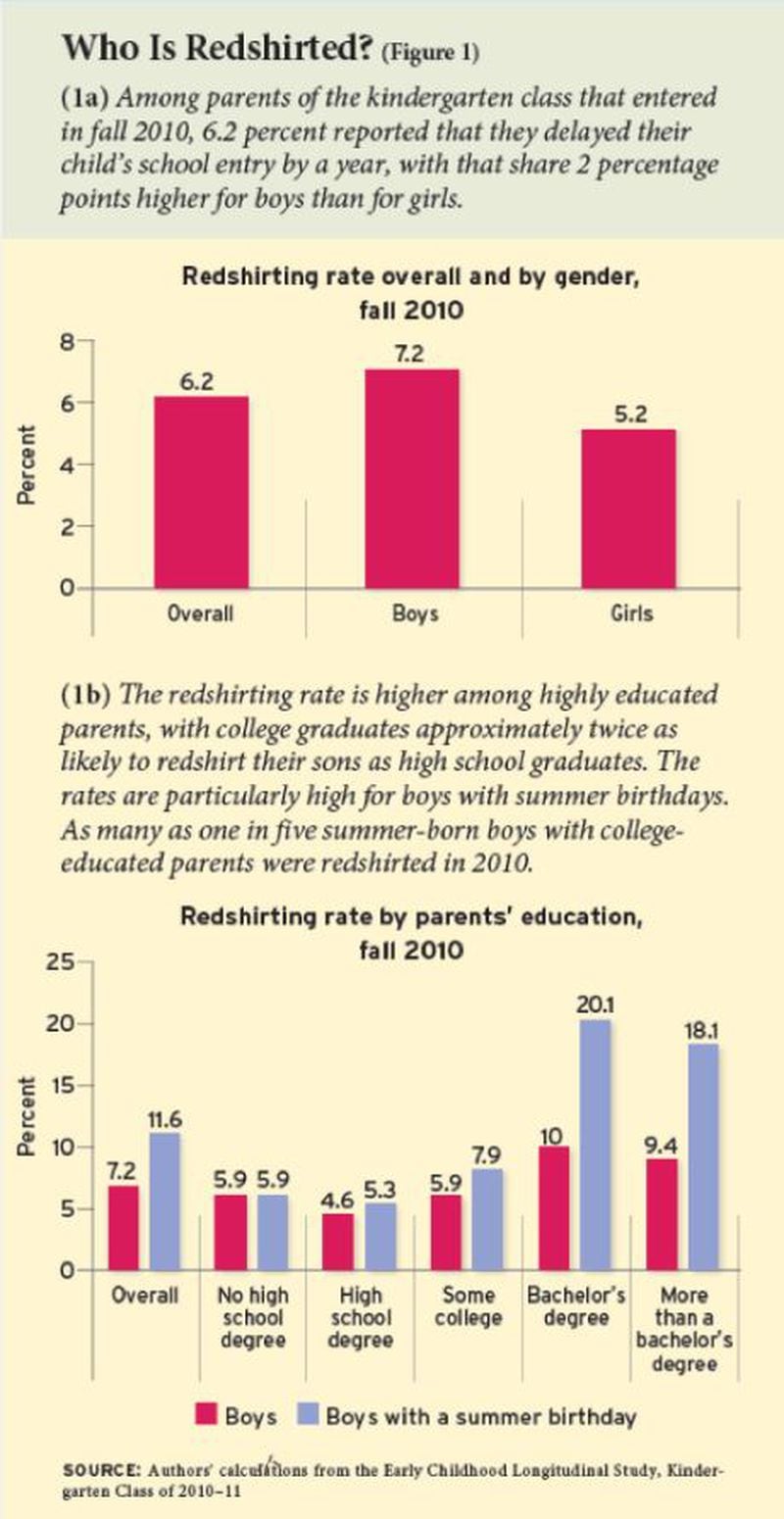Eavesdrop on any group of young parents discussing kindergarten and you'll likely hear angst about kids whose birthdays fall just before the cutoff date for kindergarten eligibility, which is Sept. 1 in Georgia
If your preschoolers are born in the summer, should you delay kindergarten a year so they’re not the youngest in the class but the oldest? This growing practice is called academic redshirting, a play on a term typically applied to college athletes who sit out a year to hone their skills.
Parents redshirt their summer-birthday offspring under the rationale that entering kindergarten at 6 better positions children for success.
But does it?
Researcher Diane Whitmore Schanzenbach is the co-author of a review published today in Education Next that casts doubt on the assumption that being older leads to stronger school performance. In the piece, she and preschool director Stephanie Howard Larson explore the outcomes of redshirting.
Schanzenbach is professor of education and social policy at Northwestern University and a research associate at the National Bureau of Economic Research. Larson is the director of Rose Hall Montessori School in Wilmette, Ill.
“Certainly, for some kids redshirting has been helpful, but, by and large, it is probably not worth it for many kids," said Schanzenbach, in a telephone interview Monday from Illinois.
The mother of three young children, Schanzenbach said the decision to redshirt often must be made months before school during spring registration. But a child's school readiness can increase in the months between registration and the first day of class.
"Development is not linear," said Schanzenbach, citing her own daughter whose delayed speech sent them to a speech therapist wondering if something was amiss. There wasn't, and her daughter soon began talking with verve.
Yes, there may be differences in student ability and maturity in kindergarten based on the age of the child, said Schanzenbach. But what parents of the youngest students have to remember is their kids will catch up. "These differences, which may seem so big at the beginning of kindergarten, dissipate," she said.
Using data from the Department of Education’s Early Childhood Longitudinal Study, Larson and Schanzenbach note parents of boys are more likely to redshirt. Among parents of the 2010 kindergarten class, 6.2 percent delayed their child’s school start by a year. Breaking it down by gender, 7.2 percent of parents of boys redshirted, compared to 5.2 percent of parents of girls
It's also more common among educated parents. When you look at boys with college-educated parents, one in five was redshirted, a rate four times that of summer-born boys with high-school educated parents. Economics may explain the disparity. When a child is redshirted, parents have to pay for another year of preschool so family income becomes a factor. Because college-educated households earn more, they're able to afford another year of preschool and may have access to higher quality preschools that make it more tempting to keep their child there.
Credit: Maureen Downey
Credit: Maureen Downey
The research shows the presumed age advantage generated by redshirting wears off with time, disappearing by high school. In their joint article, Schanzenbach and Larson write:
In the early grades, an older child will tend to perform better on standardized tests than his younger peers simply by virtue of being older. This makes perfect sense—a redshirted kindergartner has been alive up to 20 percent longer than his on-time counterpart, which means his brain has had more time to develop and he has had that many more bedtime stories, puzzles, and family outings from which to build his general knowledge. This initial advantage in academic achievement dissipates sharply over time, however, and appears to vanish by high school when, as a 9th grader, the redshirted student is at most 7 percent older than his peers.
What are the negatives of holding a child back a year? Redshirted students may be bored in class and socially isolated from less mature peers.
Earlier research, including by Schanzenbach, shows younger students reap benefits from learning alongside and competing against older classmates, including seeing a boost in their test scores.
In the end, the authors conclude:
In sum, we find that redshirting at the kindergarten level bestows few benefits and exacts some substantial costs. Both research and experience suggest that the gains that accrue from being an older student are likely to be short-lived. Because of the important role of classroom peer effects, redshirted children can be educationally and socially harmed by being with others who are performing and behaving at lower developmental levels. Furthermore, while it is hard to predict a child's likely growth trajectory in the months prior to his expected school entry, the perceived developmental delays and immaturity that prompt parents to choose redshirting in the spring have often resolved themselves by fall.
I know parents who considered redshirting their twin girls and decided against it. They wished they had when their girls reached middle school and experienced emotional and social turmoil. The parents attributed some of the problems to their girls being the youngest in their class.
The research on redshirting has not looked at the social well-being of girls who are the youngest in their class, said Schanzenbach. The focus has been on academic attainment. If the social problems were that extreme, you'd expect them to spill over to academics but the research doesn't indicate that, she said.
Ultimately, Schanzenbach said parents know best. However, she worries some preschools may tout "the gift of extra time" for late birthday kids because it means the children stay longer in their care. And elementary schools may concur because older kindergarteners are easier to teach and manage.
Parents may be influenced by exaggerated reports of the benefits of being the oldest child in a class, including the 2008 best seller "Outliers" by Malcolm Gladwell. In his book, Gladwell contends being the oldest puts students on a path to success because they build on their early academic success and earn more opportunities as a result. (The Atlantic takes on that claim in this piece, which dismisses redshirting as a "suburban legend.")
Parents ought to follow their own best judgment, said Schanzenbach, but they ought to get full information, including the downside of being older than your classmates.
About the Author








